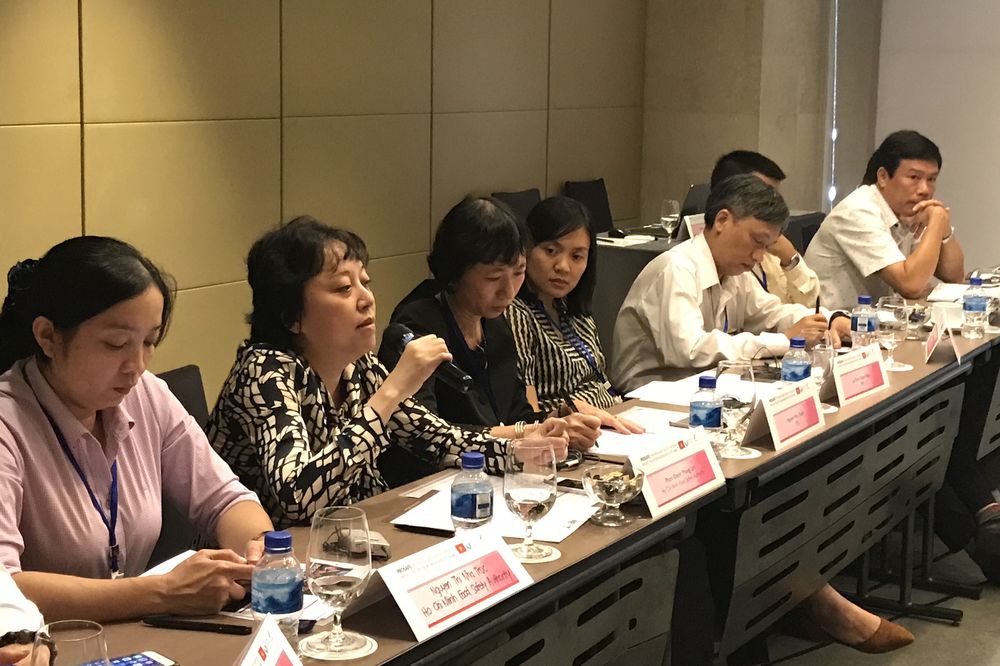“Now is the time to protect consumers, which includes all of us, from the risks of unsafe food. Success [in promoting food safety] ultimately requires cooperation from both the public and private sectors”
This was the key message of Ms. Maria Theresa Medialdia, Director of Mekong Institute’s Agricultural Development and Commercialization Department, in her opening remarks during the PROSAFE Project Inception Workshop held on September 19 in Ho Chi Minh, Vietnam. Organized by Mekong Institute through the support of the New Zealand Aid Programme, the workshop gathered 21 government officials working on food safety at the national and local levels.
Also present at the workshop was Mr. Duong Hung Cuong, Director of the Secretary of GMS Program under the Ministry of Planning and Investment’s Foreign Economic Relations Department. Serving as MI’s Coordinating Agency for Vietnam, Mr. Cuong shared how the Vietnamese government has been working with MI in building local capacities for development in the last two decades. He encouraged the workshop participants to further strengthen their collaboration with MI and take advantage of the regional organization’s course offerings and technical support.
Officials from the local food safety management boards of Ho Chi Minh and Da Nang were also invited to present their organizations’ roles and responsibilities. These city-level food safety authorities were recently established as part of the Vietnamese government’s efforts to adopt a single agency approach to managing food safety.
Ms. Pham Khanh Phong Lan, Head of the Ho Chi Minh Food Safety Management Authority (HCM FSMA), highlighted the need to improve coordination among key food safety agencies to effectively address food safety issues, especially at the local level. She shared that among their major targets is ensuring a safe food supply chain in the city, which involves regular market inspections and providing appropriate certifications to safe products. She also expressed her gratitude to MI for inviting local officials from her organization to participate in its safe food courses. She explained that the Project’s activities and targets are timely and relevant, especially for a new organization like the HCM FSA.
Mr. Nguyen Tu, Deputy Head of the Da Nang Food Safety Management Authority (DN FSMA), also took the opportunity to introduce his newly established organization to the group. While the DN FSMA has a similar structure with HCM FSMA, Mr. Nguyen emphasized that his office is relatively smaller with only 60 staff members compared to HCM FSMA’s 460 officers. He also shared that most fruits and vegetables in the city are imported from neighboring provinces; thus, adopting an effective traceability system is a challenge. He hopes that, through this workshop, his organization would be able to link with key agencies and learn from their food safety expertise and experiences.
At the workshop, the PROSAFE Project’s accomplishments and challenges during the first phase as well as the priority areas for promoting food safety in the country in the next few years were also discussed. Ms. Medialdia concluded the workshop by emphasizing that the inputs gathered from the open discussion will be integrated to the project targets and deliverables for Vietnam.
Other officials present in the workshop included representatives from the Plant Protection Department and National Agro-forestry and Fisheries Quality Assurance Department of the Ministry of Agriculture and Rural Development; National Institute of Food Control under the Ministry of Health; Market Surveillance Agency of the Ministry of Industry and Trade; Can Tho University; and the Southern Horticultural Research Institute.








